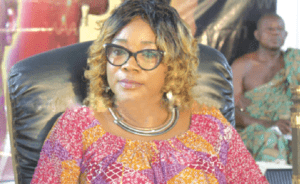Ghana makes headway on child protection – Gender Minister

Mrs Cynthia Morrison, the Minister of Gender, Children and Social Protection, has said Ghana is making a headway in its quest to protect the child.
She said the country, since the ratification of the United Nations (UN) Convention on the Right of the Child (CRC) has strengthen its laws to protect children.
Mrs Morrison was speaking at the launch of the 30 years of the UN CRC in Accra.
She said the Domestic Violence Act and Human Trafficking Act as well as other related policies are meant to complement the CRC to protect the rights of children.
The CRC was signed and adopted by the Member States of the United Nations on November 20, 1989, and has become the world most ratified treaty which sets out basic, universal standards for every human being.
Ghana became the first country to adhere to the CRC by ratifying the convention on January 29, 1990.
Mrs Morrison said Ghana in 1989 synchronized its previously existing child care legislation to conform to the CRC and created the Children’s Act 1989, Act 560.
She said since then a number of legislative and policy frameworks which include a child-rights based approach such as Child and Welfare Policy, National Justice for Children Policy, Inclusive Education Policy, Trafficking Act, Juvenile Justice Act (568), Adolescent Health Service Policy and Strategy and Expanded Programme on Immunization Policy among others, have been drafted and enacted.
Mrs Henrietta Fore, United Nations International Emergency Fund (UNICEF) Executive Director, in a message to the participants, said Ghana has shown the world how to make the CRC real by reducing mortality for children and mothers; getting more children into school and by reducing the number of girls getting married before 18 years.
She said UNICEF has been proud to walk the path with their partners in Ghana where many children don’t have access to clean water and sanitation and too many still face the barrier of poverty, discrimination and inequality.
Mrs Fore said for the next 30 years Ghana must continue moving from advocacy to realizing children’s rights adding that such rights can open opportunities and give children the tools to shape their futures.
She said in the first decade of life, there is the need to scale-up early childhood development programmes like nutrition, stimulation and protection, whilst in the second decade, “Ghana must give young people the education, entrepreneurial and digital skills they need for the world of work.
The UNICEF Executive Director said: ”As we look back at 30 years of the CRC, let’s look forward to the next 30 years, realise these rights, transform these rights into opportunities and solutions for every child and young person in the country”.
Dr Kojo Appiah-Kubi, Member of Parliament for Atwima Kwanwoma and Chairman of the Parliamentary Select Committee on Gender, Children and Social Protection, said his committee has began focusing on child rights violation like ‘Child Marriage’ which occurrence continues in the society.
He said, according UNICEF, 21 per cent of girls in Ghana were married before age 18 and these rates vary greatly between regions and can be as high as 39 per cent in the northern parts of the country but only 12 per cent in the Greater Accra Region.
Dr Appiah-Kubi said government recognizes that child marriage is a major impediment to the development of the country and the full realization of the rights of children.
“Government has also increase advocacy to end child marriage by instituting a national campaign, which culminated in the First African Ladies Conference on ending Child Marriage in Accra in 2018”.
Source: GNA
